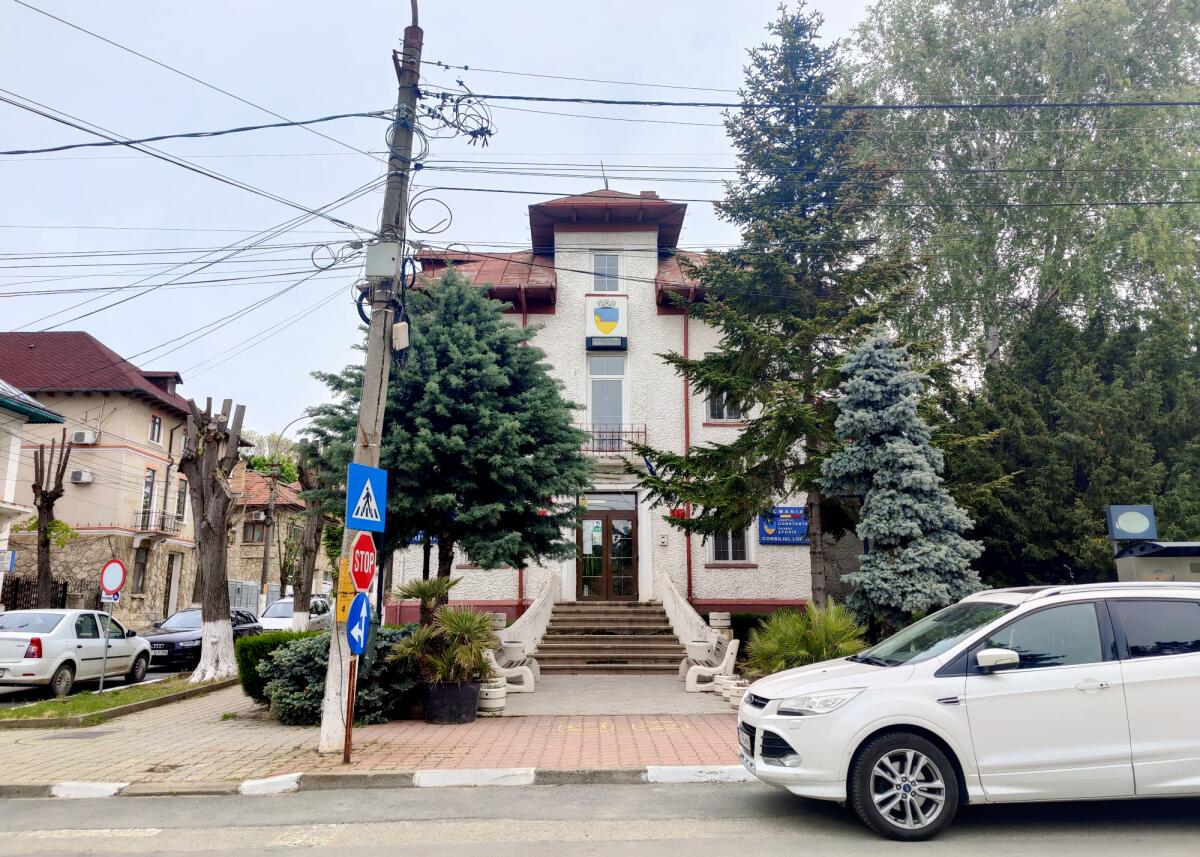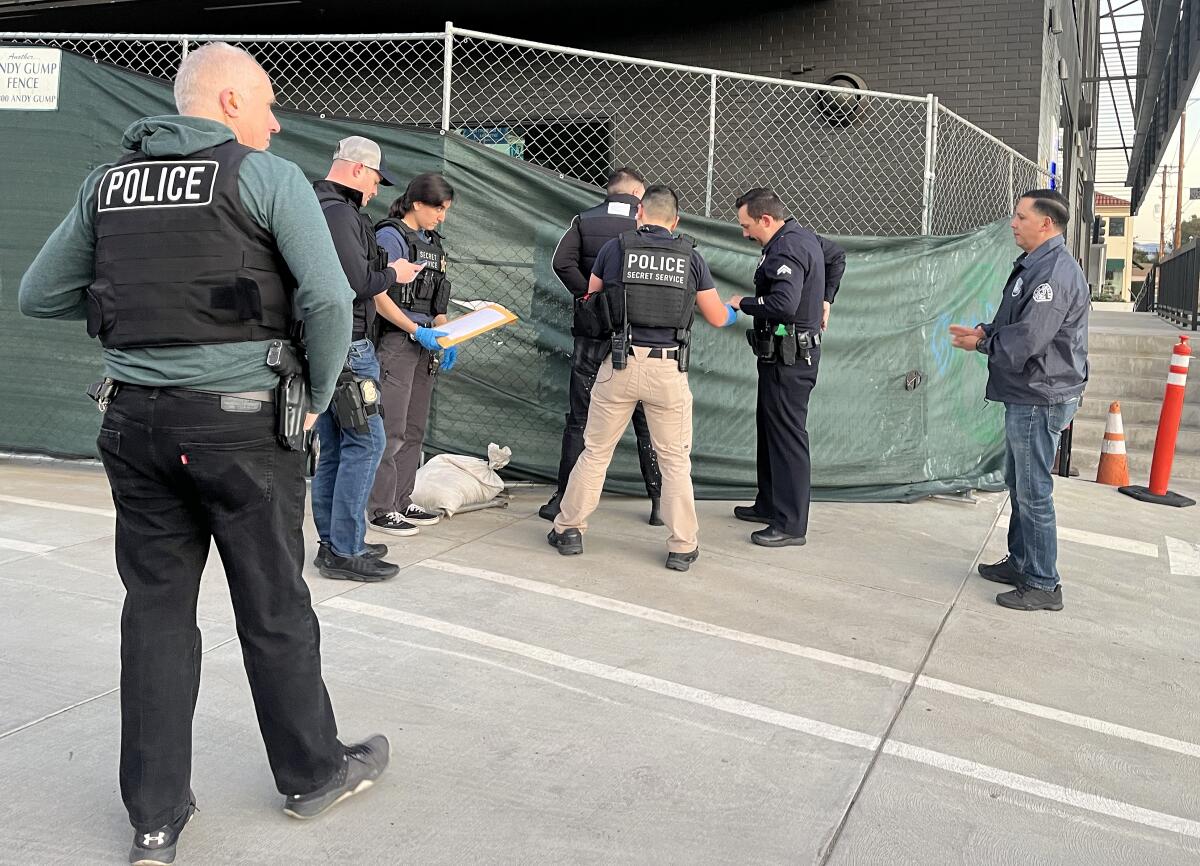ATM fraud cases surge: Why a Romanian politician is sitting in the Ventura County jail

It’s been nearly three months since anyone in the small coastal city of Eforie, Romania, has seen Virgil Negru.
The politician has been missing all spring from the quiet town of fewer than 11,000 along the Black Sea, a popular summertime destination for families escaping the heat of Bucharest, a few hours inland.
Rumors began to surface after Negru, a member of the Eforie City Council, stopped showing up to meetings at City Hall. On a breezy day in mid-May, just as tourist season was about to begin, the predominant theory among locals was that he was in a jail cell far from Eforie. Romanian TV stations said as much, but offered few details.
Another local news outlet reported the council member was “nowhere to be found.”

While his townspeople speculate, Negru, 40, has spent the last 84 days in custody some 6,600 miles from home, in Ventura County’s Main Jail, accused of attempting to steal cash meant for low-income Californians.
Around 8 a.m. on April 1, Simi Valley police staking out an ATM arrested Negru, who allegedly possessed forged cards loaded with taxpayer funds. He is among dozens of Romanian citizens who have come to the region recently to steal cash and food stamp benefits, authorities say, lured by the large number of people on public assistance and weak security on the cards that the state uses to disburse the money.
Such crimes have surged in the last two years. California has lost more than $86 million in pilfered food stamps and cash aid since November 2021, according to data provided by counties to the state.
Unlike bank cards, electronic benefits transfer cards don’t have microchips, which makes them easy to clone. With the rollout of secure cards potentially years away, frustrated social service and law enforcement agencies say they’re scrambling to stop millions of taxpayer dollars intended for the region’s neediest from being laundered to Romania every month.
Money meant for the lowest-income Los Angeles County residents is being siphoned from their EBT cards in record amounts.
“We’re essentially subsidizing organized crime,” said Nick Ippolito, an assistant director of L.A. County’s Department of Public Social Services. “It’s just insane.”
Since last spring, at least 65 people — nearly all with connections to Romania — have been arrested or charged on suspicion of theft involving forged EBT cards in Southern California, according to court records and law enforcement officials. A Romanian court translator in the region says they’ve never had so much work.
The Romanian Consulate in Los Angeles declined to comment on the arrests, but said in an email that Romanian and American authorities had developed “a very efficient partnership and cooperate closely at many levels in order to fight any form of criminality.”

Negru followed a familiar script, according to the Ventura County district attorney’s office: He arrived at a Bank of America ATM within hours of the state transferring monthly cash benefits, armed with cloned EBT cards belonging to at least eight people. He was arrested before he could withdraw the money.
He has been charged with felony forgery and identity theft and is being held in lieu of $150,000 bond. He has pleaded guilty to the charge of felony identity theft. He declined to comment through his lawyer.
His mother, Georgiana Negru, who until recently worked as a caregiver for seniors in Italy, had insisted he is simply out of town visiting family and friends.
“If he had this money, earned so easily, would I still be going to Italy?” she said, standing near the flower garden of her Eforie home. “He wouldn’t have done something to embarrass his family.”
She said Negru’s long stint abroad didn’t seem unusual to her because he used to regularly go away for months at a time to visit people in foreign countries.
“Virgil has an army of friends,” his mother said.
::
The Mid-City Los Angeles rental already stood out from the rest of the homes on the street: boxy and modern with a bright orange trim.
When 13 FBI agents forced open the door at 6 a.m. May 4, 2022, the roomy four-bedroom resembled a “skimming laboratory,” an agent wrote in an affidavit.
The home was filled with computers, pinhole cameras and skimmers — thin, hard-to-spot machines that snap onto card readers and steal personal information. When shoppers swipe cards at a machine equipped with a skimmer, their personal data are retained and can be copied onto blank cards.

The four renters inside had come from Romania solely to pursue “identity theft on an industrial scale,” prosecutors said. A search turned up roughly 1,400 forged cards of various types, according to the federal court indictment.
This was around the time cloned EBT cards came onto the radar of a high-tech crimes task force that draws from multiple local law enforcement agencies. Bank debit cards had become harder to copy as chips became standard. Cloned Employment Development Department cards, used to pilfer people’s COVID-era unemployment benefits, were falling out of fashion to clone as the pandemic ebbed and the money dried up.
By summer 2022, EBT cards had become the card fraud “flavor of the month,” said Geoffrey Elliott, an L.A. County Sheriff’s Department detective and member of the task force. Unlike in past schemes, however, the victims were exclusively low-income people.
In the last six months of 2021, EBT fraud cost the state $3.2 million in stolen funds, with losses surging to $51.9 million for all of 2022. Those losses includes cash aid meant for low-income families with children, called CalWORKs, and food stamps, known as CalFresh.
In the first three months of this year, the total loss was $31.6 million.
In California, EBT theft victims are supposed to be reimbursed for stolen money within two weeks of filling out the proper paperwork. But the wait times can stretch for weeks as overwhelmed social service agencies try to wade through the rising number of fraud claims.
Most of the theft takes place at ATMs by lower-level crime-ring members. But authorities say these operations have also found ways to turn stolen food stamp benefits into cash — by racking up exorbitant bills at grocery stores and reselling what they buy.
This past fall, a Romanian couple spent roughly $110,000 in purloined food stamps across five trips to a downtown San Diego grocery store, according to a federal complaint. The couple allegedly spent as much as $26,312 in a single grocery store run — nearly all of it on pallets of Red Bull.
Paul Radu, a Romanian journalist who co-founded the Organized Crime and Corruption Reporting Project, dates the rise of Romanian skimming groups back to the early days of the internet.
The country has long had among the world’s fastest internet speeds, which in the 1990s gave criminals an advantage in the burgeoning world of online fraud.
Romanian organized crime groups have since come to dominate in the billion-dollar skimming industry, Radu said.
“Right now, if you go to the dark web, what you can see is that there are batches of cloned cards that you can buy,” he said in an interview.
Three years ago, Radu’s news outlet exposed a massive ATM skimming gang operating along the coast of Mexico. In that case, the groups came from the Romanian city of Craiova. Federal prosecutors in Los Angeles recently charged two men from Craiova, described in court documents as a “known haven for ATM skimming crews.”

All the men arrested in May 2022 at the Mid-City rental said they were from Transylvania, authorities said. A 24-year-old arrested at the house told a judge that he dreamed of coming to California for its “cultural diversity,” but once he got here found himself “surrounded by the wrong people.” Another man wrote that he was struggling to find work in Romania due to the influx of Ukrainians displaced by war and desperately needed money for his newborn daughter.
Irvine-based attorney Brian Doyle said his client Maria Vaduva, arrested near a Placentia ATM in March, was similarly desolate and trying to provide for her children. He said she was a pawn in a complex operation.
“Some higher-up clearly must have put themselves into her life and induced her allegedly to assist a larger organization,” Doyle said. Vaduva has pleaded not guilty to federal charges and is in custody.
Attorney Donald J. Matson in Pasadena said his client Constantin Rotaru was a victim of the scammers, having become accidentally entangled with the group on a visit to the United States. Rotaru also pleaded not guilty.
“My understanding is that at the coffee shops and other places that non-English speakers congregate, people approach speaking their language, and recruit them for the footwork part of the scheme,” Matson said in an email.
Some of those arrested said they entered illegally through Mexico, according to court affidavits, while others claim to have chosen more unorthodox points of entry. Two men arrested near an ATM on March 1 said they made it from the Bahamas to Miami by boat. Another allegedly rode from Ontario, Canada, to Marine City, Mich., on a Jet Ski.
Once here, the crews operate in an “informal hierarchical structure” — various groups each with its own leader — FBI Agent Rene Persaud wrote in an affidavit.
Thirteen people suspected of running an identity and Electronic Benefits Transfer card theft operation were arrested at a Van Nuys motel, police said.
Decentralization is part of what has made Romanian skimming crews so difficult to tackle, said Louise Shelley, director of George Mason University’s Terrorism, Transnational Crime and Corruption Center.
“If you have a network organization, where the people don’t know each other, then they can’t rat on each other,” Shelley said.
A sluggish bureaucracy — easily exploited by sophisticated criminals — hasn’t helped. Local public assistance advocates say they’re frustrated with the state Department of Social Services, which has not publicly given a timeline of when chipped EBT card may be rolled out.
“We all agree that there’s no financial institution that would ever treat their money this way. They would never let it be lost this way. They’d be bankrupt,” said Heather Tallent, an investigator with the Ventura County district attorney’s office. “So why is it not safeguarded?”
Jason Montiel, a spokesperson for the agency, said “a specific timeline is not available” for implementing cards with chip technology. He said the department is “actively working to develop and deploy the use of chip and tap technologies on EBT cards” and that there are “complex technological changes required” to get it done.

In the meantime, local and federal authorities continue to make arrests, though some law enforcement officials say these arrests have been a weak deterrent. Those facing state charges have usually been released on bail or on their own recognizance. Often, they disappear.
In September, law enforcement staked out ATMs in the San Fernando Valley and central L.A. and made 16 arrests in roughly 15 minutes, according to authorities. Half pleaded no contest and were sentenced to a month of community service and two years’ probation.
The rest of the group arrested in September ditched their ankle monitors and never showed up to court. The Sheriff’s Department says a warrant is out for their arrest.
Two suspects arrested in Ventura County this March for EBT card theft similarly fled before their trials.
Their ankle monitors were found in a field in Oxnard.
::
For Virgil Negru, the costs mount as he finishes month three in a California jail cell.
He lost his seat on the City Council for missing too many meetings. The local chapter of his political party recently suspended him. And he’s vexed the town’s politicians, who still don’t understand exactly where their colleague has disappeared to.
“I was surprised to hear the rumors that he was arrested — that’s a rumor, now,” said Antonela Tode, another member of the Eforie City Council. “All I know is from TV.”
When a reporter visited Eforie with Ventura County court documents showing his charges, a few constituents said they were puzzled how Negru had ended up jailed in a coastal city far from their own. They described the councilman as a decent politician.

Lăcrămioara Vieru, who owns a cramped grocery store near the city hall, said he was on the “people’s side.” One of her customers shopping for dish sponges and vegetables remembered Negru helping get central heating delivered to her social housing block.
Others described Negru as a middling politician, memorable — in the eyes of one resident — for driving around town with the mayor in a new Audi.
Lucia Sărăcilă, 63, said she’s known Negru for decades, most recently as a colleague on the City Council — sometimes quarrelsome, but usually well-intentioned.
Like the rest of Eforie, she has no idea how one of the town’s top politicians ended up jailed in California, allegedly ensnared at the lowest rung of a criminal scheme.
“I didn’t think he was capable of this,” Sărăcilă said. “We didn’t expect this.”
Radu is a special correspondent who reported from Eforie, Romania. Ellis reported from Los Angeles.
More to Read
Sign up for This Evening's Big Stories
Catch up on the day with the 7 biggest L.A. Times stories in your inbox every weekday evening.
You may occasionally receive promotional content from the Los Angeles Times.













